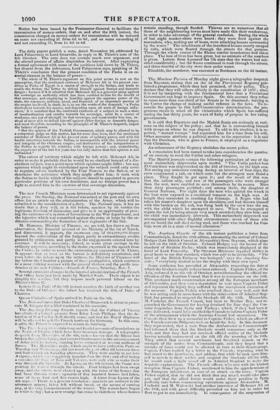The Monitor). Parisien of Monday night gives a telegraphic despatch
from Bayonne, stating that on the 3d the Provisional Regency pub- lished a programme, which they had promised, of their policy. They declare that they will adhere strictly to the constitution of 1837 ; since it is not by tampering with the fundamental laws that a Provisional Goverinnent can hope to improve Spain. On this account they refuse to cause more than one-third of the Senate to be dismissed ; leaving to the Comics the charge of making useful reforms in the laws. To re- concile the people to this half-Conservative determination, time pro- gramme recta's to mind all the vicissitudes which Spain has suffered during the last thirty years, for want of fixity of purpose in her ruling governments.
It is said that Espartero and the Madrid Junta are seriously at vari- ance on the subject of his policy ; and that he is surrounding himself with troops on whom he can depend. To add to his troubles, it is re. ported, " mutual wrongs " had separated him for a time from his wife. Other accounts attribute a political motive to the separation : it is said that the Dutchess, who is gone to France, is employed as a negotiator with Christina.
An ordonnance of the Regency abolishes the secret police.
A commission had been named to take into consideration the question of an amnesty to recal the Carlist and other refugees.
The Madrid journals contain the following particulars of one of the most melancholy shipwrecks upon recd. "The Cadiz packet-boat El Castellano was shipwrecked on the 23d of October, on the high seas. Not seeing any assistance corning during an interval of four days, the crew constructed a raft, on which none but the strongest men found a place. They fought to get upon it ; and the result of this was, that the sailors only, and two of the passengers who were stronger than the rest, were enabled to save themselves by its means. More than sixty passengers perished ; and among these, the daughter of General Narvaez. For eight days the men who quitted the wreck in the boat were exposed to a continued tempest on the high seas. At length they succeeded in reaching La Guanaja. A Negro who had taken his master's daughter upon his shoulders, and had thrown himself with this burden on the raft, was flung back by the crew into the sea, with the child which he attempted to save. When he attentpted to regain the raft (it being already very much crowded) they slew him ; and the child was immediately- drowned. This melancholy shipwreck was accompanied -with other frightful circumstances : seven of those who got on board the raft died raving mad, and those who reached La Gua- naja were all in a state of mental alienation."


























 Previous page
Previous page